感叹句疑问句
最新 高考英语复习--陈述句、疑问句、祈使句、感叹句

祈使句
类型
肯定句
否定句
Do型
V原型+其他 Listen to me.
Don’t +V原型+其 他
Don’t forget me!
Be型
Be +其他 Be careful! Be 型
Let + sb. +V原型+其他 Let me try again.
Don’t let him go. / Let him not go. Don’t + let + sb. +V原型+其 他 /Let + sb. + not + V原型+其 他
陈述句、疑问句、 祈使句、感叹句
CONTENTS
陈述句
02
疑问句
03
祈使句
04
感叹句
陈述句
DECLARATIVE SENTENCE
陈述句
陈述句用来说明一个事实或表明说话人的看法、态度等。 陈述句句末用句号,一般读降调。 陈述句有肯定和否定两种形式,其一般语序为“主语部分+谓语部分+其他成分”。
b. 带有定语从句,宾语从句的主从复合句,疑问部分 谓语根据主句的谓语而定: He is not the man who gave us a talk, is he?
c. 如果上述部分主句谓语是think, believe, expect, suppose, imagine等,则疑问部分与宾语从句相对应构 成反意疑问句。 I don't think he is bright, is he?
疑问部分用“will you”。
• Go with me, will you / won't you?
陈述句、疑问句、祈使句、感叹句精讲精练

[知识要点梳理]一、英语句子按用途可分为四类:1、陈述句:用来说明事实或说话人的看法,包括肯定句和否定句。
如:He is a doctor.I didn’t go to school yesterday.2、祈使句:用来表示请求、命令。
如:Be quiet!Don’t play with fire!3、问句:用来提出问题。
包括一般疑问句、特殊疑问句、选择疑问句、反意疑问句。
如:Do you like EnglishWhat time is itDoes he like playing football or playing basketballThey went out, didn’t they4、感叹句:用来表达强烈的感情。
如:What a fine day it is!How beautiful!二、用法讲析:1、陈述句:中考出题一般是将肯定句变为否定句。
几种常见形式:(1)含有谓语动词be,变否定时,be后加not即be not……I am a teacher → I am not a teacher.There are some books→There are not any books.(2)句子谓语动词是实义动词(如:work live)时,要用助动词do/does/did + not+ 动词原形。
如:They like swimming→They don’t like swimming.I came late → I didn’t come late(3) 句中含有all,both的句子,变完全否定时,要将all→none, both→neither,both…and…→ neither…nor…要注意谓语动词的变化。
如:All of us watched the TV → None of us watched the TV.Both of them are students.→Neither of them is a student.Both Tom and John have done the homework.→Neither Tom nor John has done the homework.(4)现在完成时、过去完成时态的句子变否定时变为have/has+not+done或had+not+done(5) had better do something变否定时为had better not do…如:You’d better have a rest → You’d better not have a rest.2、疑问句:(1)一般疑问句:一般指用Yes或No回答的疑问句。
疑问句、祈使句和感叹句(改)
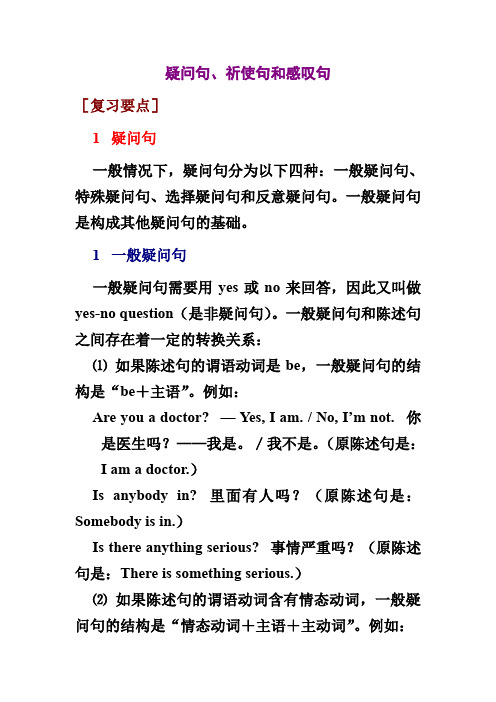
疑问句、祈使句和感叹句[复习要点]1 疑问句一般情况下,疑问句分为以下四种:一般疑问句、特殊疑问句、选择疑问句和反意疑问句。
一般疑问句是构成其他疑问句的基础。
1 一般疑问句一般疑问句需要用yes或no来回答,因此又叫做yes-no question(是非疑问句)。
一般疑问句和陈述句之间存在着一定的转换关系:⑴如果陈述句的谓语动词是be,一般疑问句的结构是“be+主语”。
例如:Are you a doctor? —Yes, I am. / No, I’m not.你是医生吗?——我是。
/我不是。
(原陈述句是:I am a doctor.)Is anybody in? 里面有人吗?(原陈述句是:Somebody is in.)Is there anything serious? 事情严重吗?(原陈述句是:There is something serious.)⑵如果陈述句的谓语动词含有情态动词,一般疑问句的结构是“情态动词+主语+主动词”。
例如:Can you swim very fast? —Yes, I can. / No, I can’t.你能游得很快吗?——我能。
/我不能。
(原陈述句是:I can swim very fast.)Must we put them away? 我们必须把它们收拾好吗?(原陈述句是:You must put them away.)⑶如果陈述句的谓语动词含有助动词,一般疑问句的结构是“助动词+主语+主动词”。
例如:Have you ever been to the Great Wall? — Yes, we have. / No, we can’t.你们去过长城吗?——去过。
/没去过。
(原陈述句是:We have been to the Great Wall.)Are they cleaning their house? 他们正在打扫屋子吗?(原陈述句是:They are cleaning their house.)Shall we water the flowers now? 我们现在就浇花好吗?(原陈述句是:We shall water the flowers now.)⑷如果陈述句的谓语动词不含be、情态动词或助动词,一般疑问句的结构就是“助动词do+原陈述句”。
15 疑问句,祈使句和感叹句

2. 特殊疑问句
对句中某一特殊部分提出疑问,通常以who, which, where, when, why, how等疑问词开首. 特殊疑问句针对疑问词来回答, 不用yes或no. What is this? 这是什么? --It’s a ball. 是只球.
3. 选择疑问句
选择疑问句提供两个以上答案,要求对方选其一来回答. 回答时不用yes或no.而要用一个完整的句子或其省略形式 Would you like tea or coffee? 你想要茶还是咖啡? --Coffee, please. 请给我咖啡.
你认为这电影怎样? What do you think of the film? How do you like the film? How was the film? ---It’s good. ---It’s good. ---It’s good.
4. What does he look like?------What is he like? 询问某人外表举止如何.
(3) 与how相关的特殊疑问词
1. how 如何、怎样 (提问形容词、副词、介词短语)
We give a computer instruction 你妈妈怎样? (身体好吗) How is your mother? by putting a programme into it. How old are you? How far is it from Beijing to Shanghai? How big is your room? 如用动词cost(花钱),疑问词可用how much, 也可用what How much / What does this coat cost?
2. 疑问词+一般疑问句语序? (问宾语、谓语、表语、状态或定语)
高中英语语法系统讲解之十四疑问句、祈使句和感叹句

高中英语语法系统讲解之十四疑问句、祈使句和感叹句疑问句疑问句用来提出问题,句末须用问号。
分为一般疑问句、特殊疑问句、反意疑问句和选择疑问句。
一. 一般疑问句一般疑问句用来询问一件事情或一个情况是否属实,需要用肯定词Yes或否定词No来回答。
一般疑问句的特点1.如果陈述句中有情态动词、助动词和be动词,把它们提到主语前,形成一般疑问语序;如果句中没有这样的词,则要借助于助动词do / did / does提到句首。
2.一般疑问句,需要首先用Yes或No回答。
3. 一般疑问句的否定式通常把be,have或情态动词和not的简略式n’t一起放在句首。
如Have you any English books? Have you considered our plan?Aren’t you satisfied with the result? Does he speak English?温馨提示:○1对一般疑问句进行肯定回答,除了可以用Yes之外,还可以用下列同义语:Certainly,Of course,Please do,Quite so,Exactly,Quite right,I think so,Yes, if you like,By all means等。
○2英语用否定句形式提问时,仍可把它视为肯定句形式的问句来回答。
但译成汉语时,差别很大。
如---Haven’t you been to the United States?---Yes, I have.---No, I haven’t.二. 特殊疑问句特殊疑问句是用来对句子某一部分提问的疑问句,以疑问词开头,句末通常用降调。
这时句中主语、谓语仍按一般疑问句结构的特点,需要部分倒装;但当主语是疑问代词或受疑问词修饰时,主语、谓语则不倒装。
特殊疑问句的特点1. 疑问词位于句首。
2. 句序:疑问词+ 助动词/ 情态动词/ 系动词+ 主语+ 谓语部分……。
初中疑问句、祈使句、感叹句
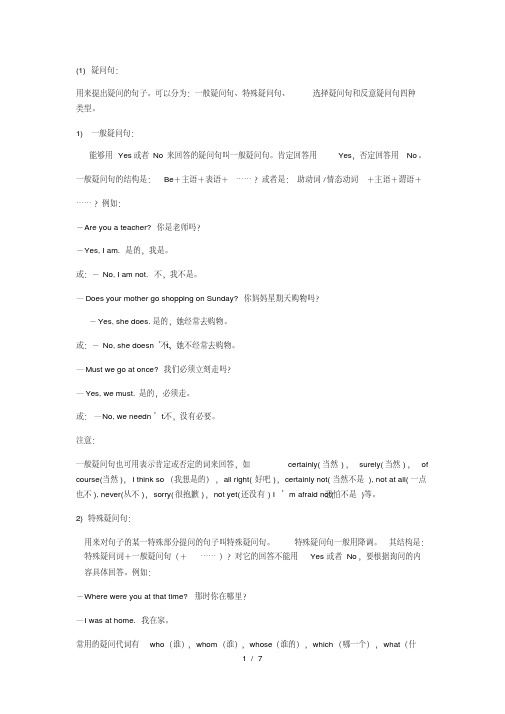
(1)疑问句:用来提出疑问的句子。
可以分为:一般疑问句、特殊疑问句、选择疑问句和反意疑问句四种类型。
1)一般疑问句:能够用Yes或者No来回答的疑问句叫一般疑问句。
肯定回答用Yes,否定回答用No。
一般疑问句的结构是:Be+主语+表语+……?或者是:助动词/情态动词+主语+谓语+……?例如:-Are you a teacher? 你是老师吗?-Yes, I am. 是的,我是。
或:-No, I am not. 不,我不是。
—Does your mother go shopping on Sunday? 你妈妈星期天购物吗?-Yes, she does. 是的,她经常去购物。
不,她不经常去购物。
或:-No, she doesn’t.—Must we go at once? 我们必须立刻走吗?—Yes, we must. 是的,必须走。
或:—No, we needn’t. 不,没有必要。
注意:一般疑问句也可用表示肯定或否定的词来回答,如certainly(当然),surely(当然),of course(当然),I think so(我想是的),all right(好吧),certainly not(当然不是), not at all(一点也不), never(从不),sorry(很抱歉),not yet(还没有) I’m afraid not(恐怕不是)等。
2) 特殊疑问句:用来对句子的某一特殊部分提问的句子叫特殊疑问句。
特殊疑问句一般用降调。
其结构是:特殊疑问词+一般疑问句(+……)?对它的回答不能用Yes或者No,要根据询问的内容具体回答。
例如:-Where were you at that time? 那时你在哪里?—I was at home. 我在家。
常用的疑问代词有who(谁),whom(谁),whose(谁的),which(哪一个),what(什么);疑问副词有when(何时),where(何地),why(为什么),how(如何)以及“how+形容词”构成的短语。
陈述句、疑问句、祈使句、感叹句
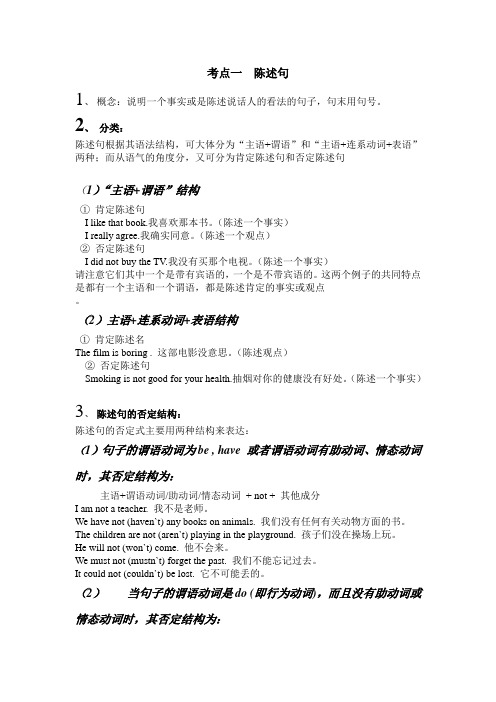
考点一陈述句1、概念:说明一个事实或是陈述说话人的看法的句子,句末用句号。
2、分类:陈述句根据其语法结构,可大体分为“主语+谓语”和“主语+连系动词+表语”两种;而从语气的角度分,又可分为肯定陈述句和否定陈述句(1)“主语+谓语”结构①肯定陈述句I like that book.我喜欢那本书。
(陈述一个事实)I really agree.我确实同意。
(陈述一个观点)②否定陈述句I did not buy the TV.我没有买那个电视。
(陈述一个事实)请注意它们其中一个是带有宾语的,一个是不带宾语的。
这两个例子的共同特点是都有一个主语和一个谓语,都是陈述肯定的事实或观点。
(2)主语+连系动词+表语结构①肯定陈述名The film is boring . 这部电影没意思。
(陈述观点)②否定陈述句Smoking is not good for your health.抽烟对你的健康没有好处。
(陈述一个事实)3、陈述句的否定结构:陈述句的否定式主要用两种结构来表达:(1)句子的谓语动词为be , have 或者谓语动词有助动词、情态动词时,其否定结构为:主语+谓语动词/助动词/情态动词+ not + 其他成分I am not a teacher. 我不是老师。
We have not (haven`t) any books on animals. 我们没有任何有关动物方面的书。
The children are not (aren`t) playing in the playground. 孩子们没在操场上玩。
He will not (won`t) come. 他不会来。
We must not (mustn`t) forget the past. 我们不能忘记过去。
It could not (couldn`t) be lost. 它不可能丢的。
(2)当句子的谓语动词是do (即行为动词),而且没有助动词或情态动词时,其否定结构为:主语+do (does,did) + not + 动词原形+ 其他成分You do not (don`t) come here every day . 你没有每天都来这里。
英语学习 疑问句、感叹句

疑问句与感叹句一一般疑问句可以用yes/ no回答的疑问句。
一般是把系动词或情态动词提到主语之前,或添加助动词并提到主语之前。
也有yes/ no之外的回答方式。
如sure, certainly, surely, of course, I think so, all right, certainly not, not at all, never, sorry, not yet, I’m afraid not等。
例如:Is this book interesting?Do you like music?Can you lift the big rock?二特殊疑问句由疑问词引导的疑问句。
主要用来询问信息。
疑问词有:who, whom, what, where, when, why, how固定短语构成的疑问句:what about, how about, how come例如:Where is my pen?Who is that boy standing behind the door?What shall we do next?三选择疑问句说话者提出两个或两个以上的答案,供对方选择。
用or连接两个并列成分。
例如:Which one do you like, apple or pear?Are you German or French?四反诘疑问句以否定形式出现的疑问句。
含有反诘口气,并非疑问,用于反问、责怪或证实一件实事。
一般用助动词的否定缩略形式。
例如:Don’t you know you are wrong again?五反意疑问句附加在陈述句后的简单问句,征询前面陈述句所说的事情的肯定或否定的意见,或希望陈述句所说的得到证实。
结构:肯定,否定?否定,肯定?例如:You like him, don’t you? 你喜欢他,对不对?You don’t like him, do you? 你不喜欢他,是不是?Note:1 主语为不定代词no one, nobody, everyone, someone, everybody, somebody, none等,附加问句的主语用they(强调全部时),或he(强调个体时)如:No one in your class can work out this problem, can they?Everyone like music, don’t they?2 主语为不定代词everything, anything, something, nothing时,附加问句的主语用it如:Nothing is left behind, isn’t it?3 one表示人做主语,附加句用one(正式)或you(非正式)如:One can never be blamed for honesty, can one?4 this/ that 用it,these/ those用they如:This is your book, isn’t it?Those are your books, aren’t they?5 there be句型在附加问句中庸there如:There is a computer in the room, isn’t there?6 must表示必须或禁止Must,mustn’t You mustn’t smoke here, must you?有必要Needn’t He must finish his work today, needn’t he?一定,想必(表推测)现在时态you must be happy Aren’t you过去时态it must rained last night Didn’t it完成时态he must have studied english for years Hasn’t he7 ought to反意疑问句部分用oughtn’t 或shouldn’t如:You ought to finish it yesterday, shouldn’t you?8 used to反意疑问句部分用didn’t或usedn’t如:she used to go to movies, didn’t she?9 had better反意疑问句部分用hadn’t 或shouldn’t如:You had better go now, hadn’t you?10 have/had to反意疑问句部分用do的相应形式如:She had to go home before eight, doesn’t she?11 陈述部分主句含有否定或半否定意义的副词或代词(如no, never, nothing, nowhere, rarely, hardly, seldom, few, little)附加疑问句用肯定式如:There is little water in the bottle, is there?12 表示愿望的I/ We wish, 疑问部分用may如:I wish you happiness, may I?13 I am的反意疑问句:am I not(正式)aren’t I(非正式),ain’t I(非标准)如:I am great, am I not?14 a, 祈使句反意疑问句部分用will you/ won’t youb, Let’s 开头的后面问句用shall we; let us或let me开头的祈使句用will youC,陈述部分为否定的祈使句可以用will you或can you如:Open the window, will you?Let’s go shopping this afternoon, shall we?Let us go shopping this afternoon, will you?Don’t leave the lights on, will you?15陈述部分如果是并列句,附加句应与临近的分句一致陈述部分为主从复合句,附加疑问句一般与主句一致如:John can speak Spanish, and his wife also can speak Spanish, can she?He said he was late for the meeting, did’t he?16 陈述部分是I’m sure, I’m afraid, I don’t think(suppose, expect, imagine, believe)+宾语从句结构,附加问句与从句一致如:He said he was late for the meeting, wasn’t he?六感叹句How:做状语,修饰形容词、副词或句子How + 形容词/副词+ 主语+ 谓语!How + 主语+ 谓语!How + 形容词+ (a/ an)+ 名词!例如:How great changes we have had these years!How short life is!How wonderful a plan!What:做定语,修饰名词(名词前可以有冠词或形容词)What + (a/ an)+ 形容词+ 名词+ (主语+谓语)!What + 形容词+ 可数名词+ 其他!What + 形容词+ 不可数名词+ 其他!例如:What a fine day!What a great pity you missed the lecture!What great fun playing computer!。
判断句的四种句式及例子
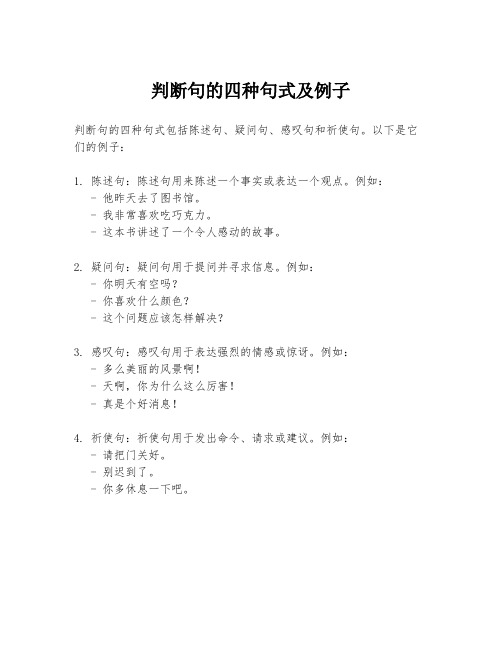
判断句的四种句式及例子
判断句的四种句式包括陈述句、疑问句、感叹句和祈使句。
以下是它们的例子:
1. 陈述句:陈述句用来陈述一个事实或表达一个观点。
例如:
- 他昨天去了图书馆。
- 我非常喜欢吃巧克力。
- 这本书讲述了一个令人感动的故事。
2. 疑问句:疑问句用于提问并寻求信息。
例如:
- 你明天有空吗?
- 你喜欢什么颜色?
- 这个问题应该怎样解决?
3. 感叹句:感叹句用于表达强烈的情感或惊讶。
例如:
- 多么美丽的风景啊!
- 天啊,你为什么这么厉害!
- 真是个好消息!
4. 祈使句:祈使句用于发出命令、请求或建议。
例如:
- 请把门关好。
- 别迟到了。
- 你多休息一下吧。
小学语文必会基础知识(陈述句、疑问句、祈使句、感叹句)

小学语文必会基础知识--句子
1、陈述句:用于告诉别人一件事或一个道理,表示陈述语气的句子,一般语调平和,句尾一般用句号。
例:(1)小明的好朋友是学生。
(2)明天我们去秋游。
(3)夜空中满是闪闪的星星。
2、疑问句:用于提出问题的句子,句尾语调上升,常有疑问词“呢、吗、呀、么”等等句尾用问号。
例:(1)这本书是你的吗?(2)你吃过午饭了吗?(3)他在做什么呢?
3、祈使句:表示命令、请求、希望或者劝阻的句子,根据语句语调可以用叹号、也可用句号。
例:(1)不许随便乱走!(2)请把那本书给我。
4、感叹句:用于抒发感情、表示感叹的句子,句尾用叹号。
例:(1)春天的景色真美呀!(2)种子的力量竟然有这么大!。
疑问句和感叹句

中考英语语法复习点:疑问句和感叹句(一)句子种类概述句子按种类可分为陈述句、疑问句、祈使句和感叹句。
(二)基础知识梳理1.疑问句疑问句就是提出问题,让对方作出回答。
英语中有四种疑问句,即一般疑问句、特殊疑问句、选择疑问句、反意疑问句。
1)一般疑问句用于询问一个事实是否属实,其回答通常是Yes或No。
其结构为:be,will,have,助动词+主语+(主动词)/宾语如:Is she a university teacher?Will it be windy tomorrow?Did he take part in the maths contest yesterday?2)特殊疑问句特殊疑问句对句中某一特定部分提问,以特殊疑问词开头根据实际情况,不必用Yes或No回答。
常见的特殊疑问词有what,who,whom,when,what,time,where,why,which,whose,how old,how many+可数名词复数,how much+不可数名词,how long,how far,how fast,how soon等。
其结构为:疑问句+一般疑问句语句如:Who has lunch fastest at school in our class?What are you doing now?How long have you lived here?3)选择疑问句选择疑问句通常提供两种或两种以上情况,询问对方选择哪一种。
回答时选择一种,不必用Yes或No。
一般疑问句+A or B如:Is there any coffee or water in the cup?Do you often play basketball or play the piano?特殊疑问句,A or B?或A,B or C?如:Which is the biggest, the moon, the earth or the sun?Which do you like better, the record or the ball?4)反意疑问句由两部分组成,前半句为陈述句,后半句是一个附着在前半句上的简短问句,回答时用Yes 或No。
英语句子种类(陈述,疑问,祈使,感叹)

把下列句子改为否定句:
My mother isn’t doing some housework now.
We mustn’t plant more trees .
Exercises :针对下列划线部分提问
• 1.We are going to Hainan Island.
Where are you going? • 2.Chinese New Year this year is in February. When is Chinese New Year? • 3.Kitty is wearing a special costume. Who is wearing a special costume? • 4.I want a skateboard for Christmas. What do you want for Christmas?
“My name is Wang Li.” “我叫王丽。” which----Thing or person (对特定的人或事物提问)。
e.g “Which man is your English teacher?”
“哪位是你的英 语老师?”
“The man in white.” “那个穿着白衣服的。”
6.There is some bread on the plate.
How much bread is there on the plate?
7.Mike is 1.35 meters tall.
How tall is Mike?
8.I’ll bring it here in a minute.
陈述句、疑问句、祈使句、感叹句

• 3、祈使句: • (1)祈使句是用来表示请求、命令、劝告或建议等语气的句子。它的主语多
是You(通常不说出)。 • (2)祈使句可分为肯定、否定两种形式。其中肯定形式的祈使句由动词原形
• 4、感叹句:
• 〈一〉种类:感叹句通常由what或how引导,一般各有三种情况: • (1)What引导的感叹句 • ① What +a(an)+形容词+可数名词的单数形式+主语+谓语! • 如:What a new watch it is!多么新的一块手表
• ②What+形容词+可数名词的复数形式+主语+谓语! • 如:What interesting books the children are reading! • 孩子们读的书多么有趣啊!
• I came late → I didn’t come late • (3) 句中含有all,both的句子,变完全否定时,要将all→none, both→neither,
both…and…→ neither…nor…要注意谓语动词的变化。 • 如:All of us watched the TV → None of us watched the TV.
开头,分两类:
• ① 连系动词 + 表语(如:形容词、名词等)引起。 • 例如:Keep quiet! 保持安静! • Be a good student!要做一我好学生! • ② 行为动词开头。例如: • Open the door! 打开门吧! • Come here! 到这儿来! • 否定形式的构成是一律在肯定形式的祈使句之前加上Don’t。例如:
陈述句,疑问句,祈使句,感叹句.

★特殊疑问句 用疑问词引导的疑问句叫做特殊疑问句。
① 疑问代词:what , who, which, whose, whom
② 疑问副词:when, where, why, how Who is the girl? What are you doing?
★选择疑问句
提出两种或两种以上的情况,要求对方选择一种情 况回答的问句叫选择疑问句。
(1) 一般疑问句 + or + 被选择的部分 — Do you likes apples or oranges? — I like apples.
(2) 特殊疑问句, + A or B — Which would you like better, tea or coffee? — I like coffee.
陈述句 疑问句 感叹句 祈使句
1.陈述句 陈述句说明一个事实或说明说话人的态度。 1.This is a book.
2. I can swim.
2.疑问句: 用于提出问题. 分为: ★ 一般疑问句,问句。
★一般疑问句 : 肯定(Yes)或否定(No)回答。
This is a book.(一般疑问句 ) Is this a book?
三. 反意疑问句
反意疑问句是在陈述句之后加一简短问句,对陈 述句所说的事实或观点提出疑问。
① Tom is a student, isn't he?
② The girl lives in Beijing, doesn't she?
③ Tom isn't a student, is he?
感叹句 和疑问句和 祈使句

感叹句、疑问句、祈使句专题句子按照用途分,可以分为陈述句、疑问句、祈使句和感叹句。
感叹句感叹句是表示喜怒哀乐等强烈感情的句子。
感叹句句末通常用感叹号,读时一般用降调。
What a clever boy he is! (他是个)多么聪明的男孩啊!What an interesting story it is! (这是个)多么有趣的故事啊!What fine weather it is! 多好的天气啊!What beautiful flowers they are! (它们是)多么漂亮的花啊!【说明】在感叹句中,What a / an 常用来修饰单数可数名词,若其前面的形容词为元音开头,则用 an。
what 是用来修饰复数可数名词和不可数名词。
但有些不可数名词,如rain, surprise, breakfast, lunch 等,当前面有形容词修饰,使抽象名词具体化时,则要用 what a / an,如:What a heavy rain it is! 多大的一场雨啊!What a great surprise it is! 这多么令人惊奇啊!What a rich breakfast it is! 多么丰盛的一顿早餐啊!How well you look! 你气色真好!How kind you are! 你心肠真好!How beautifully you sing! 你唱得真好听!Strawberries! How nice! 草莓! 多好呀!How clever the boy is! 这个男孩多么聪明啊!How fast he runs! 他跑得多么快啊!【说明】how还可以修饰动词构成感叹句,但动词不提前。
如:How I want to be a doctor! 我多么想成为一名医生啊!How she dances! 她跳得多好啊!How +形容词+ a +名词+其他成分!How+形容词或副词+其他成分!What +名词+其他成分!What +a+形容词+名词+其他成分!What + 形容词+复数名词+其他成分!What + 形容词+不可数名词+其他成分!请看以下例子:①It’s an interesting film. 这是一部有趣的电影。
疑问句、感叹句、祈使句、倒装句类
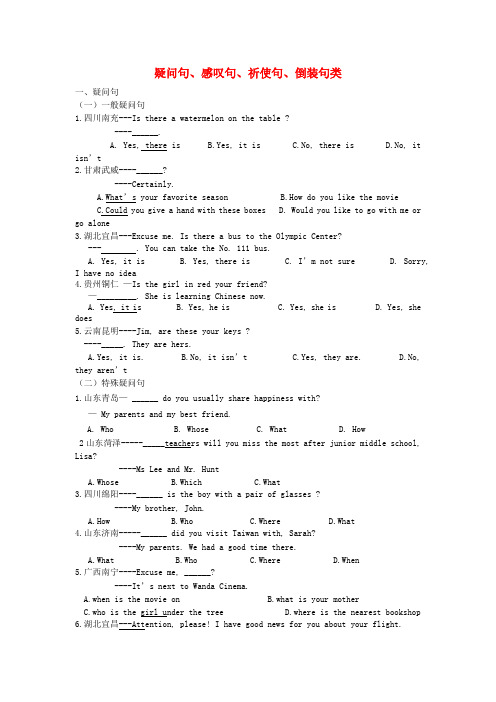
疑问句、感叹句、祈使句、倒装句类一、疑问句(一)一般疑问句1.四川南充---Is there a watermelon on the table ?----______.A. Yes, there isB.Yes, it isC.No, there isD.No, it isn’t2.甘肃武威----______?----Certainly.A.What’s your favorite seasonB.How do you like the movieC.Could you give a hand with these boxesD. Would you like to go with me or go alone3.湖北宜昌---Excuse me. Is there a bus to the Olympic Center?--- . You can take the No. 111 bus.A. Yes, it isB. Yes, there isC. I’m not sureD. Sorry,I have no idea4.贵州铜仁—Is the girl in red your friend?—_________. She is learning Chinese now.A. Yes, it isB. Yes, he isC. Yes, she isD. Yes, she does5.云南昆明----Jim, are these your keys ?----_____. They are hers.A.Yes, it is.B.No, it isn’tC.Yes, they are.D.No, they aren’t(二)特殊疑问句1.山东青岛— ______ do you usually share happiness with?— My parents and my best friend.A. WhoB. WhoseC. WhatD. How2山东菏泽-----_____teachers will you miss the most after junior middle school, Lisa?----Ms Lee and Mr. HuntA.WhoseB.WhichC.What3.四川绵阳----______ is the boy with a pair of glasses ?----My brother, John.A.HowB.WhoC.WhereD.What4.山东济南-----______ did you visit Taiwan with, Sarah?----My parents. We had a good time there.A.WhatB.WhoC.WhereD.When5.广西南宁----Excuse me, ______?----It’s next to Wanda Cinema.A.when is the movie onB.what is your motherC.who is the girl under the treeD.where is the nearest bookshop6.湖北宜昌---Attention, please! I have good news for you about your flight.--- ?A.What are theyB. Where is itC. How are youD. What is it7.黑龙江绥化---_____ did you write to last night ?----A pen pal.A.WhatB.WhereC.Whom8.山东东营 ----_______is your father?----He's an engineer in a big factory.A. WhoB. WhatC. WhichD. Where9.云南昆明----______?----Great! Everyone had fun.A.How was the school trip yesterdayB.How often do you exerciseC.Did you ride a horseD.Can you do the dishes10.云南----_____will the 2016 Summer Olympic Games be held in Brazil ?----In August.A.WhenB.HowC.WhyD.Where11.贵州毕节----______ do you often get to school , Michael?-----On foot.A.HowB.WhenC.WhatD.Where(三)反意疑问句1.江苏宿迁---There is a beautiful park near your school, _______?---Yes. I often go walking there.A.is thereB.isn’t thereC.are thereD.aren’t there2.贵州安顺He can hardly stay awake because he is so tired, _____ ?A.is heB.isn’t heC.can’t heD.can he3.湖南永州David never fights with his classmates , _____?A.does heB.doesn’t heC.isn’t he4.黑龙江龙东Let’s go to Disneyland in Shanghai in August, ______ ?A. shall weB. will youC. won’t you(四)选择疑问句1.山东济南---Bill, does your sister have brown hair or red hair ?----_____. She takes after my mother.A.Yes, she does.B.No, she doesn’tC.Brown hairD.I don’t know.2.吉林长春----Do you improve your spoken English by communicating with others or reading aloud?----________. I make lots of new friends in this way, too.A. Yes, I do.B. I like English very much.C. No, I don’t.D. By communicating with others.3.辽宁丹东Our mother’s birthday is coming .Do you want to buy a wallet or a scarf for her ?---______.She got a beautiful scarf last week.A.Yes, I do.B.No, I don’tC.A scarfD.A wallet二、感叹句1山东烟台 ----_____ weather it is ! Shall we go for a picnic ?----I can’t agree more.A. What a goodB. What goodC. How good theD. How good2.福建福州----_______ angry Kangkang looks!What happened ?---He found his mother reading his diary when he returned home yesterday.A. HowB.WhatC.What an3.湖南株洲 _____pleasant journey it is !A.HowB.WhatC.What a4.四川宜宾 ______fine weather we have today !A.What aB.HowC. What5.温州 ---Do you think the Terracotta Army in China is more than 2,000 years old? ---Wow! ______.A. How large it is !B. How modern it is !C. What a long history it has!D.What a beautiful it is !6.山东滨州----Jane won the first prize in the English speech contest.----_____ big progress she has made ! She used to be weak in English.A. HowB.How aC.WhatD.What a7.重庆B卷 --- TuYouyou has won the Nobel Prize.--- ______ great she is! We Chinese are so proud of her.A. What aB. WhatC. How aD. How8.新疆阜康、米泉_____ weather it is today! We’d better stay at home.A.What hotB.How hotC.What a hotD. How a hot9.连云港----_____heavy the rainstorm is !----Yes, the town has experienced the most serious flood during the past ten years.A.HowB.WhatC.How aD. What a10.四川巴中---A famous singer is going to hold a concert here in July.----Really? _____ exciting news!A.HowB.What anC.What11.江苏宿迁---Did you watch the China’s Military Parade on TV?---Yes. _______ great it was!A.HowB.WhatC.How aD. What a12.上海______ wonderful speech Emma gave at the UN conference!A.HowB.WhatC.What aD.What an13.山东济南----Making paper bottles ? Wow, _____great idea!----Thank you. We may use less plastic in this way.A.howB.whatC.what anD.what a14.陕西---Volunteers from Lantin Saving Team have saved many travellers in the mountains.----_______ they are !A.How great a manB.How great menC.What a great manD.What great men15.黑龙江齐齐哈尔The girl got the only chance to study abroad. _____ proud her parents felt!A.HowB.WhatC.What a16.湖北宜昌 ---The firemen did all their best to put out the fire.--- excellent firemen!A.WhatB. What anC. How anD. How17.湖北咸宁——The__________Brazil’s Olympic games will be held on August 5.——_________exciting news for the long summer vacation!A.thirty-one; How aB.thirty-first; WhatC.thirty-first; What anD.thirty-one; How18.江苏淮安______ great fun Andrew has ______ DIY in the art room with his classmates!A. What; doingB. What; doneC. How; doingD. How; done19.黑龙江绥化_____cold weather it is !A.How aB.What aC.What20.黑龙江龙东he temperature in June is still low. ______ bad the weather is!A. WhatB. HowC. What a21.吉林长春________ great news it is! We’ll have a school trip next week.A. What aB. WhatC. How aD. How22.吉林---Do you know some robots are able to serve as waiters in the restaurant?----Really ? ______ interesting it is !A.WhatB.What aC.How23.辽宁丹东---We are going to take part in Running Man.----______exciting news!A.WhatB.What anC.HowD.How an24.云南昆明----Have you watched the boat races this Dragon Boat Festival?----Yes. ______ wonderful races!A.What anB.What aC.WhatD.How25.云南______exciting boat race it was ! Many people watched it.A.What aB.What anC.HowD.How a26.新疆乌鲁木齐----_____exciting news it is the Disneyland in Shanghai has openedto the public!----______. We plan to go there this summer holiday.A.What an , So is itB.What, So it isC.How, So it isD.How, Sois it三、祈使句1.山东泰安:As we all know, life is short but amazing. ______it !A. EnjoyB. To enjoyC. EnjoyingD. Enjoyed2.四川攀枝花______ you r umbrella, or you’ll catch a cold on such a rainy day.A. TakeB. To takeC. TakingD.Taken3. 重庆B卷 --- Jack, don’t always copy what others do. ______ your head, please.--- Thanks for telling me.A. UsingB. UsedC. UsesD. Use4.山东济南 ______dressed now! We have to go in ten minutes.A.GettingB.GetC.To getD.Gets5.吉林长春________ me an e-mail before you come to Hangzhou. I’ll meet you at theairport.A. SendingB. To sendC. SendsD. Send6.贵州六盘水______late for the meeting, it’s impolite.A.NoB.NotC.Don’tD.Don’t be四、倒装句1.四川攀枝花----I think you are different now.----Of course, times have changed and _____.A.so have IB.so I haveC.neither have ID.neither I have2.黑龙江龙东I don’t know if you ______ to Mary’s party next Sunday. If you go, ______.A. go ; so will IB. will go ; so will IC. will go ; so do I3.新疆乌鲁木齐----_____exciting news it is the Disneyland in Shanghai has opened to the public!----______. We plan to go there this summer holiday.A.What an , So is itB.What, So it isC.How, So it isD.How, So is it参考答案:一、疑问句(一)、一般疑问句ACBCD(二)、特殊疑问句1--5:ABBBD;6---11:DCBAAA(三)、反意疑问句BDAA(四)、选择疑问句CDC二、感叹句1--5:BACCC; 6---10:CDAAC; 11---15:ACDDA; 16---20:BBBCB; 21---26:BCACBB三、祈使句AACBDD四、倒装句BBB。
